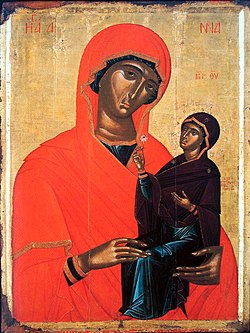Saint Anne
| Saint Anne | |
|---|---|

|
|
| Mother of the Virgin, Mystic, Maternal Heroine, Woman of Amram | |
| Born | c. 1st century BC |
| Venerated in | All Christianity All Islam |
| Canonized | pre-congregation |
| Feast | July 26th (Western calendar) July 25th (Eastern calendar) November 20th (Coptic calendar) |
| Attributes | Book, door, with Mary, Jesus or Joachim |
| Patronage | Brittany, Canada, Detroit, carpenters; childless people; equestrians; grandparents; homemakers/housewives; lace makers; lost articles; Fasnia (Tenerife); Mainar; miners; mothers; moving house; old-clothes dealers; poverty; pregnancy; seamstresses; stablemen; sterility; children |
Saint Anne (also known as Ann or Anna) of David's house and line, was the mother of Mary and grandmother of Jesus according to apocryphal Christian and Islamic tradition. Mary's mother is not named in the canonical gospels, nor in the Quran. Anne's name and that of her husband Joachim come only from New Testament apocrypha, of which the Gospel of James (written perhaps around 150) seems to be the earliest that mentions them.
The story bears a similarity to that of the birth of Samuel, whose mother Hannah (Hebrew: חַנָּה Ḥannāh "favor, grace"; etymologically the same name as Anne) had also been childless. Although Anne receives little attention in the Latin Church prior to the late 12th century, dedications to Anne in Eastern Christianity occur as early as the 6th century. In the Eastern Orthodox Churches and Eastern Catholic Churches, she is revered as Hannah. In the Eastern Orthodox tradition, Hannah is ascribed the title Forebear of God, and both the Nativity of Mary and the Presentation of Mary are celebrated as two of the twelve Great Feasts of the Orthodox Church. The Dormition of Hannah is also a minor feast in Eastern Christianity. In Protestantism, it is held that Martin Luther chose to enter religious life as a Augustinian monk after crying out to St. Anne.
...
Wikipedia
